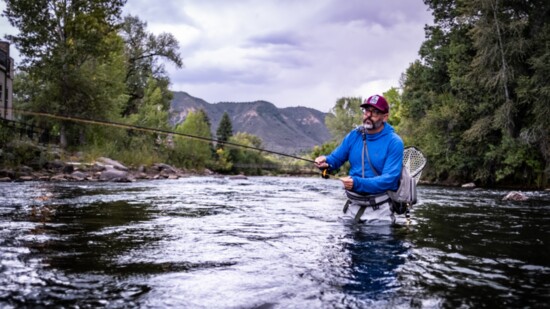Sunshine gilds the river’s rills and runnels in silver lamé. Birds chatter. Buggy clouds swirl over the water. Birds swoop and snatch these snacks. The cold current shoves your bare legs with steady pressure. A similar pressure shoves your hunter’s instincts to fool nature.
Your relaxed wrists and shoulders flick the long rod. Your line loops as it dances with the air. Your fly hovers, daubs, and drifts until—bang! The line yanks taut and heavy. The exuberant fish, lipped on the hook, leaps from the water. Its scales glint and wink—a firing squad of paparazzi cameras.
You reel. The fish fights with a colossal tug, and then…the line goes slack. The soggy fly returns, dripping not with your prey but water.
“The lost [fish] are the ones far more remembered than the ones you catch,” says Andy McKinley, a longtime employee with Duranglers, the local source for flies, supplies, and guides since 1983.
McKinley discovered fly fishing at age 11 when a dazzling fly-tying demonstration caught his fancy. The men deftly spiraled colorful craft supplies around tiny hooks. Threads, fine wires, chenille yarn, marabou feathers, tiny crystalline beads—these items, when twisted, imitate the food that fish like to nosh. Wooly Buggers. Lucky-B’s. Jigged Mini Leeches. Rat-Faced McDougals. Whatever the nickname, dry flies are most commonly designed to mimic caddis flies, stone flies, and mayflies. Wet flies will resemble the nymph or underwater adolescent insect. Streamers are flies that imitate smaller fish such as minnows.
“Some people will say it's art, but it's like functional art—the idea that you can create something and wow, you've fooled a fish!” McKinley notes.
Anglers, or fisherpersons who use hooks rather than nets to catch fish, have been fly fishing since at least the 2nd century, according to Roman historical records. McKinley loves the challenges fly fishing presents. Good anglers are also skilled entomologists; they know their bugs and how to present them as natural food to the fish. They have keen water literacy, too. As McKinley explains it, “Reading water, meaning…there's riffles, runs, pools, boulders, rapids, all sorts of stuff. You know where that fish is going to be sitting based on the type of water, maybe the water temperature, and time of year.”
McKinley pushes back against misperceptions of fly fishing as a men’s-only sport. He states, “I think women pick it up faster. Especially with the fly cast—it's not about strength and power. It's actually about just letting the rod do the work. Same with being patient, for sure.”
That fly fishing is an elitist pastime is yet another myth McKinley strives to debunk. “There’s a perception of fly fishing that it's a high-dollar, very expensive sport. When it comes down to it, it isn't. Fly fishing is just the next level up rather than just sitting by a lake throwing bait out.”
That said, all anglers, be they snobs or noobs, pros or hobbyists, can rely on Duranglers for a wealth of resources. In addition to a well-stocked shop on Main Avenue, they also offer guided fishing expeditions on local lakes and rivers, courses on casting and fly-tying, and various other summer clinics. They can also help curate and coordinate far-flung fly-fishing trips to Belize, Puerto Rico, Mexico, Argentina, and the Christmas Islands.
Pulsing at the heart of the hobby is deep appreciation for and an understanding of natural habitats. Honing the angler’s mindset over many years has altered McKinley’s personality and outlook for the better. “I would say it helps me with patience in learning, patience in trying to get something right,” he says. Fly fishing has also spurred him to be more adventurous. He is more willing to explore new trails should they lure him to trout or bass. Any vacation is suddenly more enticing should it promise the chance to fish new waters. McKinley admits, “I start to look at areas differently. I'm like: Oh, so we're going to go visit Idaho. What's up there to fish? And I start researching that and learning about different regions and what's available.”
No doubt, you may be itchin’ to go anglin’ and before you take up the rod and reel, keep in mind McKinley’s sober safety warning: if you’re going to fly fish, you’re going to get hooked. He doesn’t mean snagging a hook on your finger (though that does happen); rather, he means beware of the obsession.
“Some people are obsessed with the numbers of fish they catch. Some people are obsessed with just catching a giant fish,” McKinley says. But all fishermen crave the same moment. “Feeling something on the end of your line…feeling a fish get hooked.”
"The lost [fish] are the ones far more remembered than the ones you catch."
